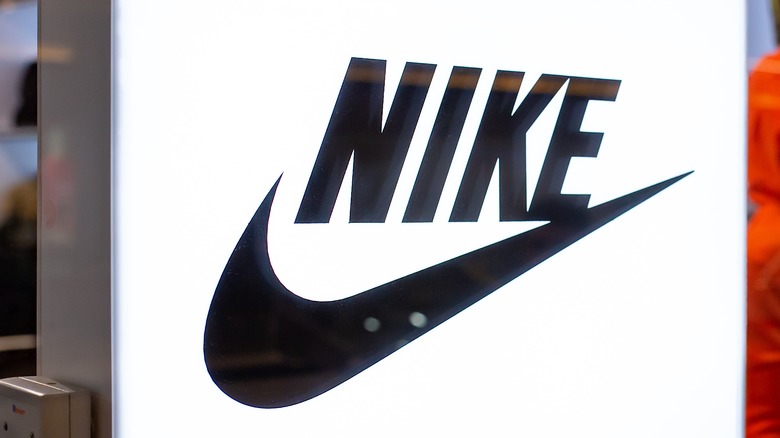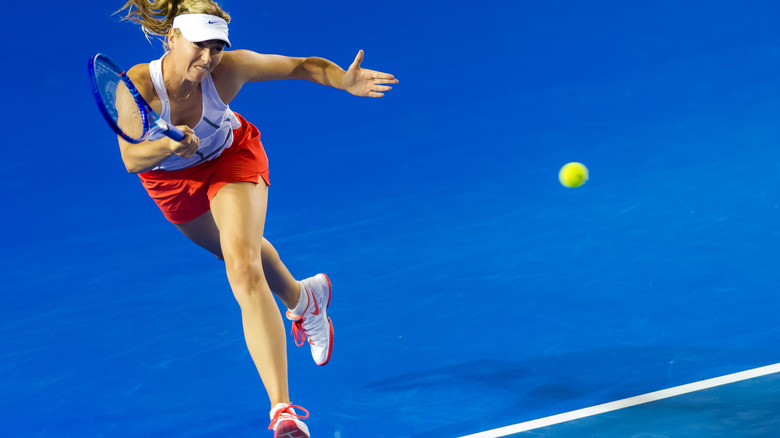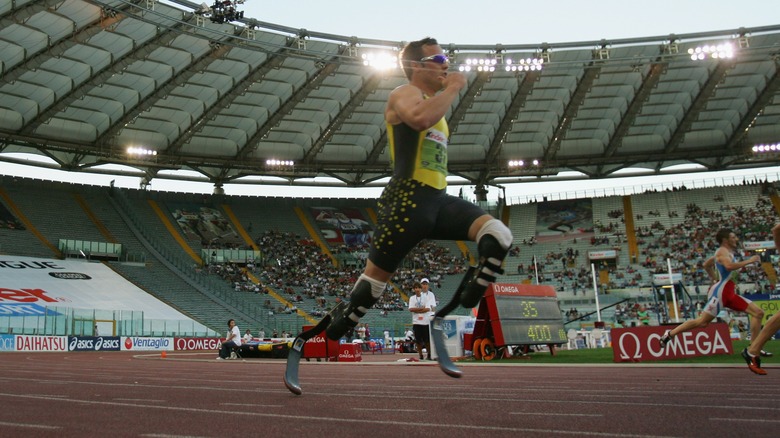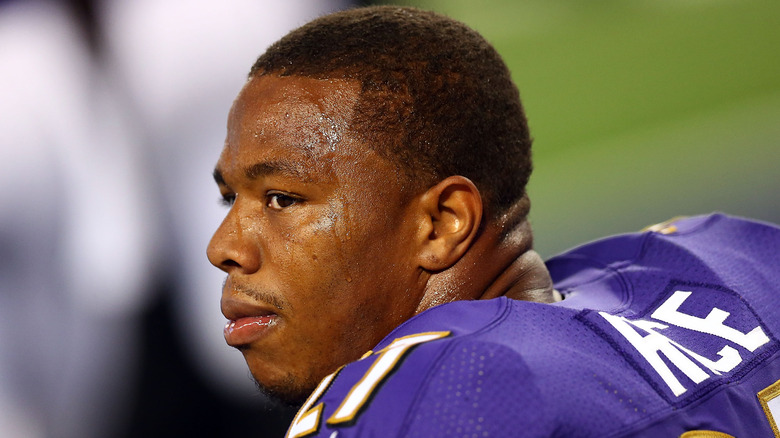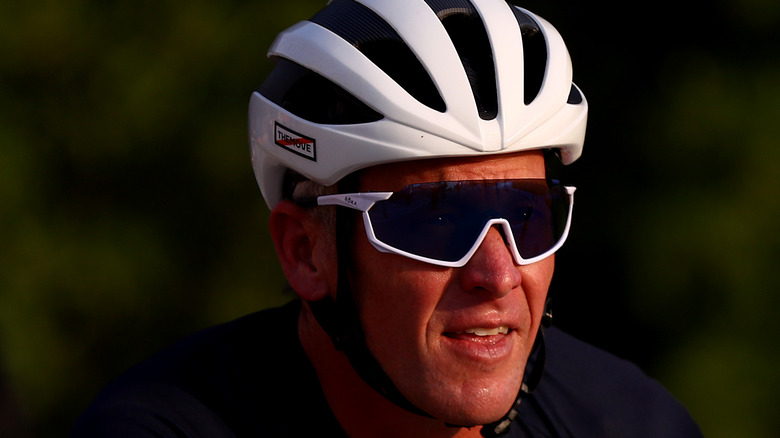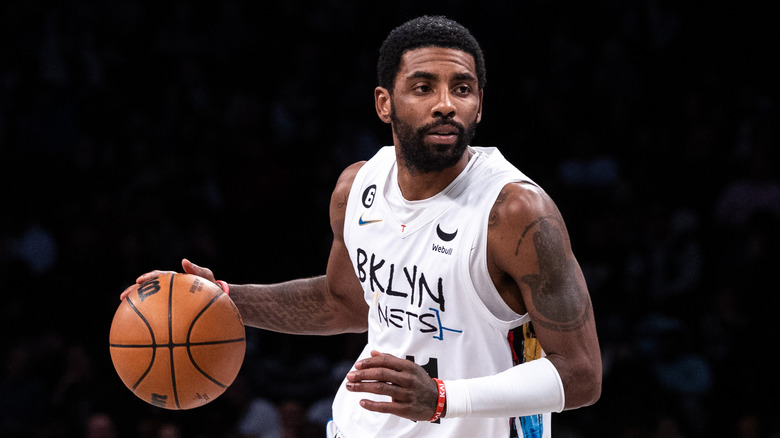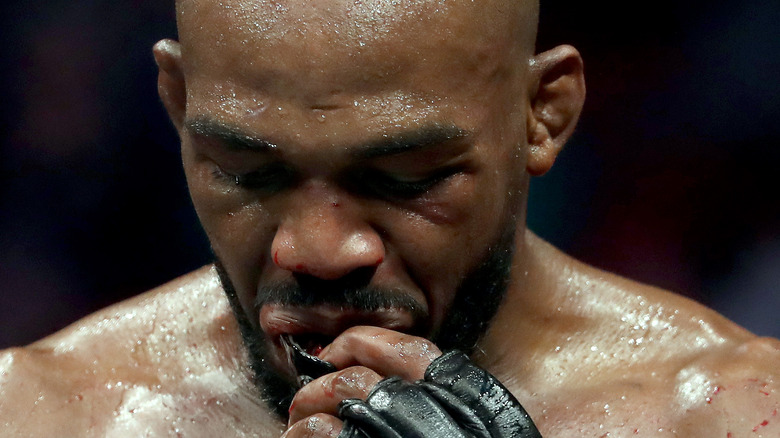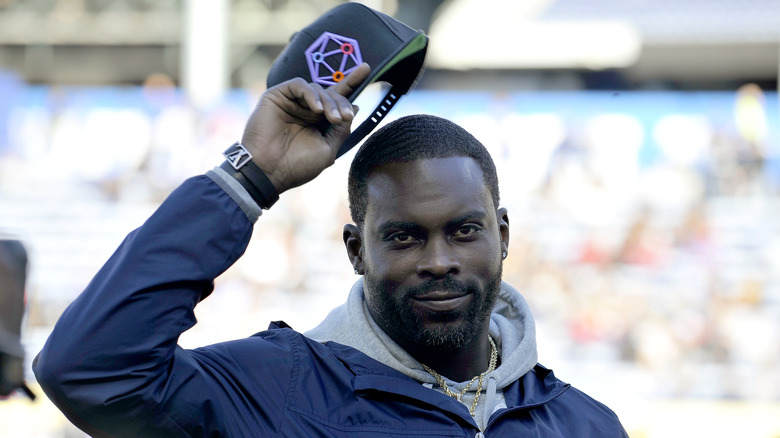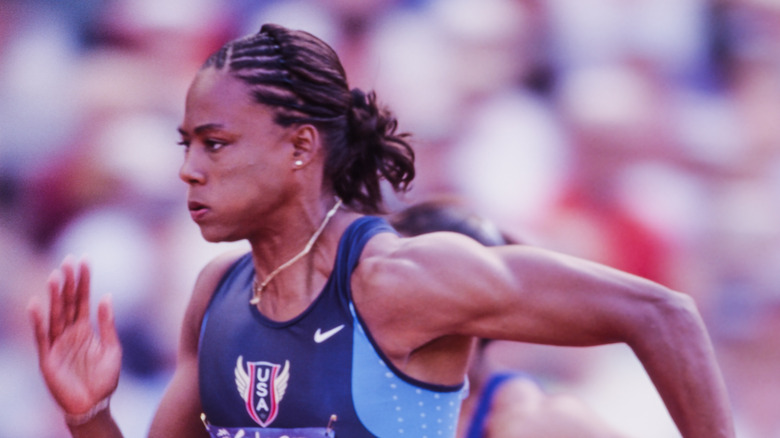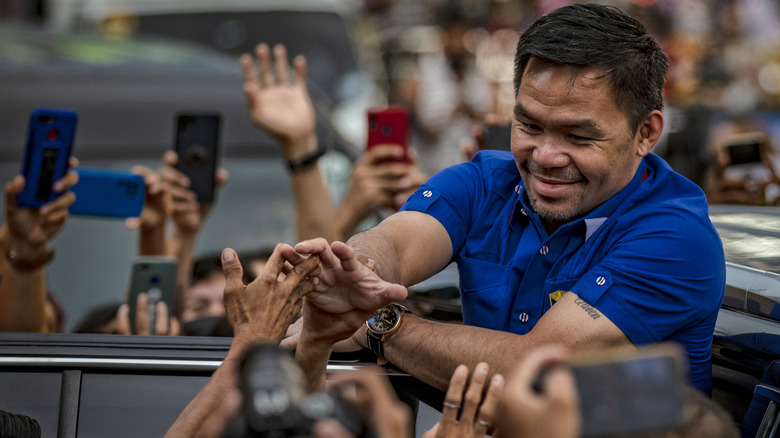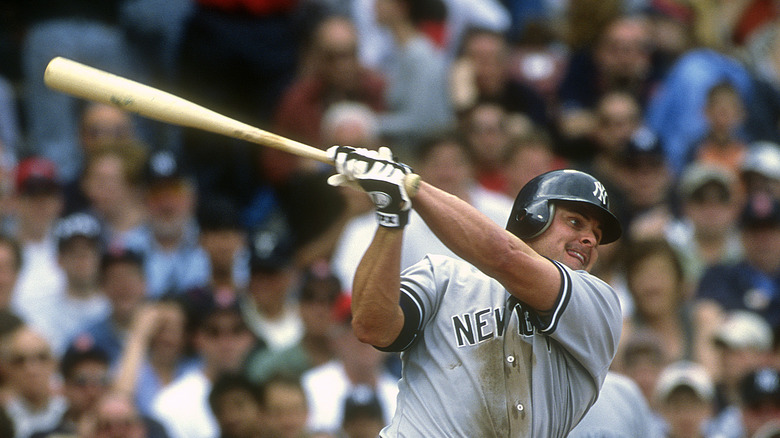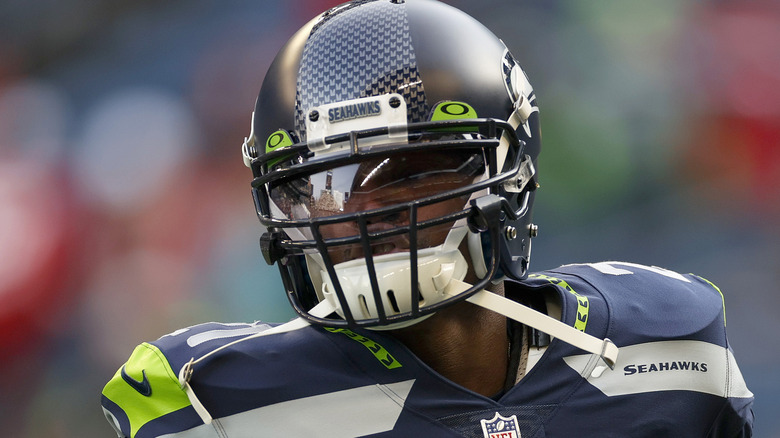Athletes Dropped By Nike
It's easy to be cynical about marketing and advertising. So much money, copy, graphic art, and video is spent on drumming up interest in products no one really needs. The celebrity endorsement isn't any more immune to a critical attitude. The association with a given public figure of a certain reputation might enhance the glamor of a brand for some, but for others, cologne is no different — and no less expensive — no matter which movie star appears in the ads. And all the endorsements by all the athletes in the world won't let this or that shoe give undue enhancement to your own sports performance.
Love it or hate it, endorsement deals and targeted ad campaigns are the way of the world in the 21st century, and Nike knows how to play the game. Over the years, they've entered into agreements with athletes from all manner of sports, relying on them to hawk athletic wear and equipment and enhance their name and logo with their star power. CEO John Donahoe told the Wall Street Journal in February 2020 that ad campaigns were dictated by the athlete featured in them, and that extended into whether or not to weigh in on controversial issues. But sometimes, words or actions by an athlete will compel Nike to act by cutting ties. Scandals, prejudice, and poor performance have all scuttled endorsement deals over the years.
Maria Sharapova
The Nike Swoosh brands everything from footwear to tennis rackets, and they enter into endorsement deals for all of it. They're prepared to aim young, too. According to the BBC, the brand first started doing business with Russian tennis player Maria Sarapova when she was only 11. Sharapova was a professional by age 14 (per Britannica) and picked up three Grand Slams between 2003 and 2008. She powered through injuries to keep up in the early 2010s, and Nike offered her a $70 million sponsorship deal at the start of the decade. Sharapova also entered agreements with Porsche and Tag Heuer.
All three sponsors took notice when Sharapova failed a drug test in 2016. She admitted later to taking meldonium — a performance-enhancing drug — since 2006. In light of the confession, Tag Heuer declined to renew their contract with her, Porsche put the brakes on its campaign, and Nike suspended their agreement. But a few months later, according to GQ, the company had a change of heart. Meldonium was only added to the banned substances list in 2016, and Sharapova's long use of it was on doctor's orders.
After its initial decision to cut ties, Nike ended their suspension and stood in Sharapova's corner when she received a two-year ban from the International Tennis Federation. While she successfully appealed for a reduced sentence and got back into the game in 2017, Sharapova never recovered her full stride and hung up her racket in 2020.
Oscar Pistorius
It doesn't always take bad behavior on the part of an athlete to land an ad campaign in hot water. When Nike put out a series of ads in 2011 featuring sprinter Oscar Pistorius, "the blade runner," a photographic time lapse of Pistorius shooting off the starting line had the words "I am the bullet in the chamber" to one side and Nike's "Just Do It" slogan on the other. Reactions to the image were sometimes heated. "It's a bad ad in general," sports consultant Marc Ganis told the New York Daily News. "After Columbine, we should have had greater sensitivity in these kinds of ads."
A whole new set of issues around the campaign was opened up in 2013, when Pistorius was arrested on suspicion of shooting and killing his girlfriend. Nike was quick to issue a statement offering solace to the grieving survivors, but the headlines brought fresh scrutiny to their endorsement practices. Human foibles and crimes can turn a brand sour very quickly. "Double entendres, sexual references and phrases that include violence are being looked at for exactly this reason," brand consultant Robbie Vorhaus told CNN Business.
Another consultant advised Nike, through CNN Business, to quickly drop Pistorius from their roster. The company did suspend their contract with the sprinter almost immediately after the headlines hit, but they didn't formally end the relationship until September 2014, when Pistorius was found guilty of murder (per ESPN).
Ray Rice
Baseball may be America's national pastime, but football stars often seem to shine brighter. Nike isn't the only brand to pursue players of the game. At one time, Baltimore Ravens running back Ray Rice was tied to Nike, EA Sports, and VertiMax (per ESPN). And why not? He had an enviable career in the NFL. The league had him at 13 in their list of the top 100 players of 2013 (via NFL), the same year the Ravens won Super Bowl XLVII against the San Francisco 49ers, 34 to 31 (per ESPN).
But Rice's performance on the field didn't absolve him of responsibility when he was caught on camera engaging in violence with his fiancée Janay Palmer in Atlantic City in September 2014. The footage was shocking enough to invite commentary from President Barack Obama through a statement. Rice's team and his league were quick to cut ties (per ESPN), and Nike swiftly followed suit. Some department store chains were ahead of the brand in disassociating themselves with Rice; his jersey was gone from Dick's Sporting Goods and Modell's before Nike made any announcements.
Lance Armstrong
Celebrities of all stripes have experienced a rise and fall from grace, but Lance Armstrong's was particularly cutting for many. The cyclist was a source of hope and inspiration for fans, not just for his consistent performance in the Tour de France, but for doing so after overcoming a severe bout of testicular cancer. Armstrong led two different teams to multiple victories in the Tour de France, and he established the Livestrong charity for cancer patients. Nike not only entered into endorsement deals with Armstrong as an athlete; they contributed to his organization (per The Guardian).
Throughout his time in cycling, Armstrong faced several accusations of cheating, charges he always ferociously denied. But in 2012, a USADA investigation into the United States Postal Service team found that not only had Armstrong used various performance-enhancing drugs, he had pressured his teammates into doing the same over many years. According to The Guardian, the investigators considered the scheme the worst doping scandal in cycling's history as a sport.
Armstrong initially maintained his denials, and Nike seemed inclined to accept his version of events. But the mounting evidence against Armstrong couldn't be denied past a certain point. In October 2012, Nike issued a statement that they had parted ways with the cyclist. That said, they maintained links with Livestrong — an arrangement only possible because Armstrong resigned as its chairman.
Kyrie Irving
It isn't necessary for an athlete to do something horrible to lose endorsement deals. Sometimes, saying something awful is enough. Not a rude comment to fans or reporters or a show of ignorance in an interview, but a naked statement of prejudice or bigotry. Such a statement ended Kyrie Irving's long association with Nike.
Irving's association with the brand goes back to 2011, before he had signed with the NBA (per ESPN). Within three years, he had the rare honor of launching his own shoe line, which reportedly came second only to LeBron James' line in sales. Irving's name didn't just move merchandise with lay customers either; a number of his fellow basketball players favored the Kyrie.
Unfortunately, Irving's name was soiled by his promotion of antisemitic material on social media in 2022. The posts compelled the Brooklyn Mets to bench him for eight games, unpaid, and Irving did offer a written apology after a time (via CNBC). But the remarks Irving echoed, and the time that passed between his posting them and his apology, was too much for Nike. They terminated his contract months before it was set to expire, though Irving's agent claimed that it was a joint decision between the brand and the player. Irving himself took to Twitter, posting a GIF captioned "there's nothing more priceless than being free" in what CNBC took as a probable reference to the terminated deal.
Jon Jones
Everyone goes through misunderstandings in life and business. Mix-ups in the latter can be a minor embarrassment or a financial inconvenience. Or, they can make sports and entertainment headlines. Unfortunately for Nike and MMA fighter Jon Jones, light heavyweight champion of the UFC, their misunderstanding turned into the latter.
According to MMA Fighting, Jones gave the impression during an interview that a fight outside the ring with Daniel Cormier in August 2014 cost him an endorsement deal. The altercation did have an impact on his relationship with Nike, but not in the way it was taken by the press, as Jones later clarified. Months prior, Nike informed him that they were stepping back from MMA as a targeted market, which led Jones to feel he didn't want to represent the brand.
The two parties had reached an accord that would release Jones from his contract early when he and Cormier had their fight. This prompted Nike to move the timeline of their split with Jones forward slightly. Jones offered an apology for giving the wrong impression — but, when he signed with Reebok later that year, he took care to point out their dedication to martial arts over Nike's.
Michael Vick
You can set records, you can win championships, and you can bring home the biggest paycheck out of all your colleagues, but if you're mean to dogs, your career and your sponsorships will suffer. Michael Vick was noted for his talent on the football field from a young age; according to Britannica, he had helped Virginia Tech rack up two stellar seasons before the Atlanta Falcons snatched him in 2001. As their quarterback, Vick set records and, according to AP, first entered into an endorsement deal with Nike.
Vick's deal with Nike was worth $2 million in 2007 according to NPR, a sum on top of the then-unprecedented $130 million contract he had with the Falcons. But in April of that year, Vick was implicated in a dogfighting ring and later pled guilty to conspiracy charges. Nike dropped their deal with him and called off a shoe line with his name, a development that was probably a secondary concern to Vick behind his prison sentence.
After his release, Vick got back into football, this time with the Philadelphia Eagles. After serving his time and reaching out through interviews and charitable work, everyone from the NFL to President Barack Obama seemed inclined to give him another chance. And that included Nike. They entered a new endorsement deal with Vick that lasted from 2011 to 2019, when they opted not to renew the contract.
Marion Jones
Sometimes, brands like Nike will immediately cut their ties with a celebrity when controversy looms. On other occasions, they might opt to quietly run out the clock. This was the strategy used with sprinter Marion Jones, who won three gold medals at the 2000 Olympics in Sydney. She picked up endorsements with Nike and Vogue, with the latter company dubbing her "The New American Hero" (via the Los Angeles Times).
But within three years, Jones was implicated in the BALCO drug scandal. Her lawsuit against the company's founder, and litigation against her by a former trainer, made public a precarious financial situation. A run of bad publicity about her relationships and behavior tarnished her image. And in 2006, Jones failed a drug test, compounding suspicions that she relied on performance-enhancing drugs dating back to the BALCO scandal.
By then, Jones and Nike had parted company. Besides all the scandals, the sprinter had a poor showing in 2004. Her contract with Nike ran out in 2005, and per CNBC, the company opted not to renew it. When Jones' drug scandal reached the point of a probable public confession in 2007, it was speculated that Nike might try and recover their investment from the endorsement deal, but CNBC reported that the brand wasn't interested.
Manny Pacquiao
These days, Manny Pacquiao probably puts more of a premium on public polling than endorsement deals; he's a politician in his native Philippines, where he competed in the presidential election of 2021 and finished a six-year term in the Senate in 2022 (per Britannica). But for decades, the Pac-Man, as he was nicknamed, was the talk of the boxing world, setting records with his title victories in more weight classes than anyone before. That kind of performance made him a boon to sports brands, and his endorsement deal with Nike included his own logo.
Pacquiao was wearing that logo when he issued a public apology in 2016 (via ESPN). The apology was for homophobic remarks, in which he claimed that same-sex couples were "worse than animals." Even in his apology, he maintained his opposition to same-sex marriage. Nike ended their eight-year association with Pacquiao, logo and all, and issued a statement repudiating the boxer by name. "Nike strongly opposes discrimination of any kind," they added, "and has a long history of supporting and standing up for the rights of the LGBT community."
2016 was also the year that Pacquiao announced his retirement from boxing, a decision he would later rescind until 2021. 2016 was also when Pacquiao won his election to the Philippine Senate; his bad luck with sponsors, and his prejudiced remarks, didn't halt his political ambitions.
Jason Giambi
It can seem silly to focus on the brands an athlete wears during a game. Shouldn't their performance, or the strength of the team, or the fun of the game be more important? What did it matter in 2005, when New York Yankee Jason Giambi wore Mizuno shoes against the Red Sox without having a contract with them (per ESPN)? Is it necessary that he have the Nike swoosh, or the Pepsi circle, or the Arm & Hammer logo, or any other brand from the companies that contributed to his $4 million endorsement earnings?
It may not have mattered to how Giambi and the Yankees played against the Sox that game, but Giambi didn't have ties to Nike, or many of his other former sponsors, by that point in his career. After admitting to steroid use as part of the BALCO investigation in 2003 (per the San Francisco Chronicle), companies started dropping him. Pepsi traded Giambi for his teammate Alex Rodriguez, and Arm & Hammer chose not to renew their contract with him. Nike cut ties in 2005, ahead of an away game for the Yankees in Kansas City. But ESPN questioned whether the steroid confession — which was, after all, over a year prior — was the only factor in Nike's decision. Giambi's performance in the ballpark was sliding by 2005, which would complicate his selling a brand dedicated to athletic excellence.
Adrian Peterson
Severing ties with a celebrity can come in stages. Before a clean break, a company might suspend their endorsement deal or issue statements putting space between them and their partner without taking formal action. Suspension was the step one of choice by Nike when it came to Minnesota Vikings running back Adrian Peterson in 2014, when he was accused of violence against his own children.
Per CNN Money, Peterson used a switch to whip his son and came under indictment. While he remained connected to the Vikings, he was benched following the charge, and his contract with the NFL became an open question. A motor oil sponsor dropped him altogether, while Nike went with a suspension. They went a step further when Peterson entered a plea deal on misdemeanor charges.
That was the end of Peterson's relationship with Nike, but not with the Vikings. According to Britannica, he returned to the field for them the following year and stayed with the team until 2017. Since then, he's been attached to the New Orleans Saints, Arizona Cardinals, Washington Commanders (before their name change), and the Detroit Lions. Most recently, he signed with the Seattle Seahawks (per the NFL).
